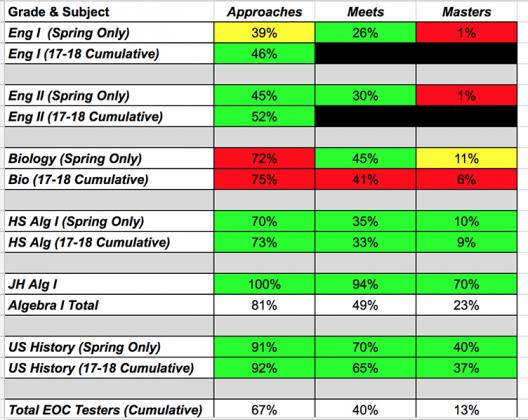Snyder ISD officials saw things to like and dislike in this school year’s end-of-course (EOC) tests scores.
Snyder students showed at least slight improvement in all EOC test subjects — English I and II, biology, high school and junior high school algebra and U.S. history — but district officials still see room for improvement.
Overall, 67 percent of Snyder students passed their EOC exams this school year, said Dr. Rachael McClain, assistant superintendent for curriculum and instruction. Forty percent of the students tested this year met standards, while 13 percent mastered standards.
McClain pointed with pride at EOC history and algebra test results — 92 percent of students passed the history exam, up from 87 percent last year, and 81 percent of algebra students, including everyone at the junior high school, passed their EOC test this year.
The biggest area of concern, said McClain, was the relative non-improvement in English EOC scores.
Results released by the Texas Education Agency show that 46 percent of Snyder freshmen passed the English I exam, compared to 44 percent the previous year. The results were similar on the English II test, where 52 percent of sophomores passed the test this year, compared to 49 percent in 2016-17.
In biology, 75 percent of the students passed the test this year, compared to 76 percent in 2017.
“Obviously, we’re very pleased with algebra and history overall,” McClain said. “We still have work to do in English, and I want to see improved success in biology, as well.”
McClain said there was more than one reason behind the static English test results.
“We’ve had quite a bit of turnover in the English department the past few years,” she said. “When you continue to have that, it’s hard to get much of anything established with the kids and it’s hard to get a grasp on the whole process. Plus, the English exams are very challenging.”
But McClain wouldn’t lay all the blame at the feet of teachers.
“There is a large group of students going through the high school now who spent a lot of time on ‘improvement required’ campuses,” she said. “So we’re still feeling the effects of that.”
Several steps to turn around the English scores are already in the works, starting with Christy Suttle, the new department head for English, attending a reading and writing academy designed to help teachers develop effective strategies to help students succeed.
Another step the district is taking, McClain said, is investing in a reading program first purchased for Snyder Junior High School last year.
“We saw reading scores for the junior high kids grow noticeably,” she said. “We hope to see the same improvement at the high school level.”
Image
Body


